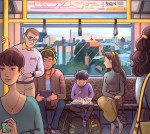When I landed in LA to start college at UCLA in the fall of 2016, I was ecstatic. I grew up in Boise, Idaho, a far cry from a big city, and the vastness and excitement of LA was almost overwhelming for me. But since those first days in Westwood, I began to feel as though I still lived in a small, boring town. I felt dishonest when I said I lived in LA, wanting to add a footnote explaining that I actually live in Westwood, which isn’t LA, not to me.
I constantly have a hard time understanding myself as a Bruin within the broader context of an expansive metropolis like LA, which certainly has more to offer beyond our little corner of Westwood. The city sprawls ceaselessly across neighborhoods, communities and freeways, and envelops every single person along its route into the identifier “Angeleno.” But, stuck in Westwood, I’ve become too caught up calling myself a Bruin and I’ve almost forgotten I exist within a certain duality, like all Angelenos.
“I’m from Echo Park, I’m from Koreatown, I’m from Venice.” These are some of the different ways of distinguishing ourselves and generating nuance under an umbrella term that doesn’t quite fit us all.
The recognition of this tension that came with my move to LA and the limitations of living in Westwood urged me to explore my fragmented identity, and what I can do about it. I started to see UCLA a little differently in relation to the rest of the city: I began to view it as a strictly limited space, tucked into the Westside. I wanted to know why I feel so disconnected here.
UCLA is a space without close Metro rail stops, nestled among mansions and “drunk food” spots tailored to student life. Sometimes in Westwood, I feel like I can’t understand the Los Angeles that exists south of Wilshire Boulevard or beyond the Westside.
I had nearly the opposite experience while living in Berlin for a study abroad program. I felt at home there and even now that I’m back to life in LA, I still feel quite a bit like a “Berliner” in a way I haven’t yet been able to replicate with “Angeleno.”
This question of identity that life at UCLA poses had a simpler answer when I was studying in Berlin during fall quarter. Within less than a month of arriving in Germany, I felt I could call myself a Berliner. Immediately, I recognized a difference between my identity in Berlin and my identity in LA. So, I tried to pinpoint what aspects of my Berlin life I could bring home to LA with me. I wanted that same comfort associated with home I had found in Berlin, but I wanted to feel it when I was actually at home in LA.
One morning it hit me as I made my 11-mile, hourlong commute to Freie Universitat Berlin in Lankwitz from my apartment in Prenzlauer Berg on the east side of the city: Despite the lengthy journey, my commute never bothered me. Instead, it was one of the main ways I was able to stake out a space for myself among so much newness; all around me sat Berliners sharing a morning quietly, and here I was, indistinguishable from them, so long as I didn’t open my mouth and let my bad accent spill out.
I felt a mundane sort of kindness in our ability to share something seemingly insignificant, as small as a bump in the road or a few stops between transfers. And it stuck with me, not only the sense of belonging I noticed that morning, but also the appreciation for the possibility of unlimited movement throughout a sprawling city.
My commute meant a lot to me, but it would be simplistic to say this belonging was just about the cozy mornings on the train. It was also about understanding the array of spaces and communities that lie alongside transit routes – spaces I would have never interacted with if it weren’t for the train.
Witnessing the changes in the neighborhoods out my tram window enabled me to form a holistic picture of the communities, people and areas that make up Berlin. Not to mention the small, but kind, interactions I experienced with other commuters – small “entschuldigungs,” the German word for “Excuse me.” At UCLA, I don’t have this same experience. But that isn’t because it’s impossible. If I learned anything from Berlin, it’s that public transportation is a powerful tool, and it can change the way I understand myself in relation to the spaces and people around me.
“When you ride the bus you see a shift in different parts of LA. You see different neighborhoods and different cultures all spread around,” said Michelle Morales, a third-year art student and lifelong Angeleno. She said transit was one of the things that gave her a sense of connection to LA as her hometown, as she reminisced on cutting high school classes and taking the bus wherever it would go just to explore.
Taking the bus in LA isn’t the same as it is in Berlin. LA public transit sees fewer riders, buses run less frequently and travel times can be a lot slower. But speaking with Morales reminded me that avoiding these inconveniences comes at the cost of losing out on community. In the Westwood bubble, I’m getting a one-sided picture, and it’s hard for me to situate myself among the rest of the city when I’m not even sure what or who is out there.
